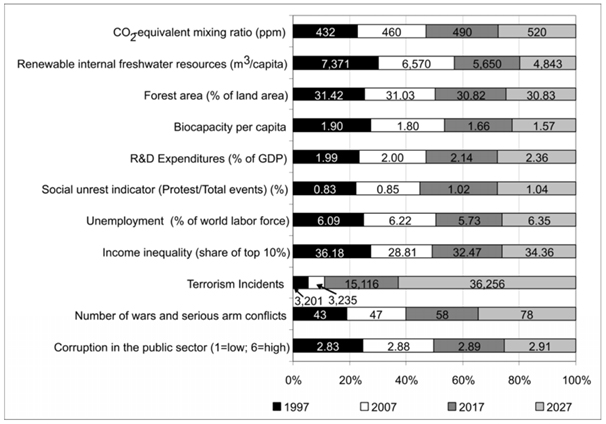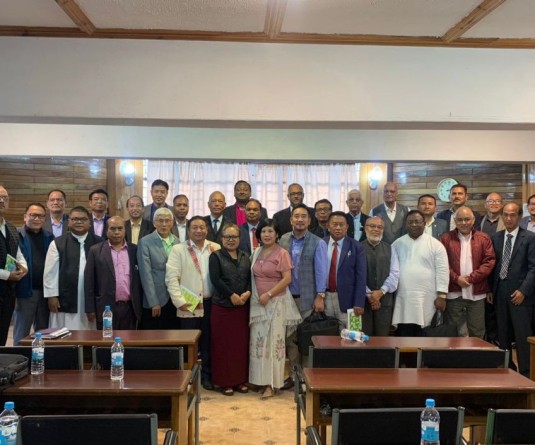
Ruchinilo Kemp
Dimapur
As we come close to the end of another decade and set ourselves on course for a new one, the 2020’s. I suppose it will be worthwhile as a community if we could take some time to ponder on the past to draw on our learnings and, look forward with a better perspective.
In this article, I would make an attempt to draw the readerstake a bird eye view of some of the key challenges underpinning our world today. At the same time, I admit that deliberating on all these issues would be beyond the scope of this article, so my role here would be limited in giving a nudge to facilitate interested minds to explore further.
While a great deal has been written and discussed on this issue, notable amongst them is the Sustainable Development Goals (SDGs), where most policy framework today are designed to tackle the challenges mentioned there. I would encourage the readers to check‘The Millennium Project’on the internet.It is an independent non-profit global participatory futures research think tank of scholars, business planners, and policy makers who work for international organizations, governments, corporations, NGOs, and universities.Their work is comprehensively focused on our topic in addressing the question of how?However, for those interested in knowing just the key challenges of our times, here is a list of the 15 challenges which provides a framework to assess the global and local prospect of humanity.
1. How can we achieve sustainable development for all while addressing global climate change?
2. How can we have sufficient clean water without conflict?
3. How can we balance population growth and resources?
4. How can we bring genuine democracy out of authoritarian and corrupt regimes?
5. How can we enhance decision-making during unprecedented accelerating change?
6. How canthe global convergence of information and communications technologies work for everyone?
7. How can we encourage ethical market economies to help reduce the gap between rich and poor?
8. How can we reduce the threat of new and remerging diseases and immune micro-organisms?
9. How can we make education more intelligent, knowledgeable, and wise to address global challenges?
10. How can shared values reduce ethnic conflicts, terrorism, and the use of weapons of mass destruction?
11. How can the changing status of women help improve the human condition?
12. How can we stop transnational organized crime networks in becoming more powerful?
13. How can the growing energy demands be met safely and efficiently?
14. How can we accelerate science& technology to improve the human condition?
15. How can do we incorporate ethical considerations more routinely into public decisions?
In order to get a sense of how the world (humanity) is trending, here is a comparative analysis based on someindicators which have been categorised into two parts (a) Where we are winning (b) Where we are losing/no progress.
Chart A: Where we are winning

(Source: State of the Future 2017)
Chart B: Where we are losing/no progress

(Source: State of the Future 2017)
The ‘State of the Future 2017’ report says, “Although we are winning more than losing, where we are losing is very serious. “Business as usual” trend projections for water, food, unemployment, terrorism, organized crime, and pollution could create complex future disasters. Humanity has the means to avoid these disasters and build a great future, but too many of the necessary decisions and cultural changes to improve our prospects are not being made.” This statement provides a key anecdote to most of our challenges today, ‘inter-connected/ dependent’ nature of problems – this simply means, one problem could be the cause of another problem. This brings us to the other part of the article where I will try to explain the ‘inter-connected nature’ of problems through a case study.
I supposewemust be aware of the news on the alarming rates of air pollution at Delhi, suddenly the looming crisis of climate change about unsustainable weather patterns anddevelopmentseemed to have dawned upon us. Keeping such scenario in mind, how do we as citizens and as Christian make sense of it. There has been a lot of debate on the news about its cause and the parties responsible for it.However, there is no clear winner or loser here, but everyone is. Let me de-clutter it for you. There was a crisis of groundwater scarcity in Haryana and Punjab, likewise, the state govt. passed a legislation (Subsoil Water Act of 2009) which restricted farmers to cultivate rice (water-intensive crop) during summer season. As a result, they started growing rice in monsoon. Since rice takes longer time to grow than traditional monsoon crops of the region, the period between harvest of rice and sowing of wheat for winter season became very short, subsequently, farmers has to quickly burn rice stubble (straw) to clear the fields for wheat sowing, resulting in smog. The question now is; why couldn’t they change crop patterns? or why was there a water crisis in the first place? Farmers are resistant to change crop patterns because, rice offers a steady minimum support price and, export of rice to global market is easier/ cost effective because of irrigation subsidy (govt. cannot reduce irrigation subsidy because it will become a political issue). In this case, for every kilo of rice being exported to global market, we end up exporting 2400 litres of water required to grow the same. On why the water scarcity? For a city like Delhi to grow, it requires millions of tons of water which it has to draw large part from neighbouring areas of Haryana and Punjab. Such is the nature of systemic challenge- interconnected. Solution to such problems had come in the past, but with a lot of rigorous trials, critical evaluation, and honest deliberation.
In conclusion I would like to end with one of the challenges stated above; “How can we make education more intelligent, knowledgeable, and wise to address our challenges?”.I understand the education system today is not short of challenges. Nonetheless, it is the strongest lever we have if we are to go ahead. In an era of artificial intelligence and machine learning where computers can outperform the human mind on skills traditionally intrinsic to humans like memory, capacity to recall and intensity to deliver analytics, research says education of human mind that generates ‘creativity’, foster‘individual’ as well as ‘collective’ ‘intelligence’ and help people analyse ‘phenomena’ would ensure the relevance of the human mind. Considering the world view (Judeo-Christian) common to most of us in Nagaland, allow me to add a caveat-a human mind nurtured (educated) in the word of God would not only usher wisdom in addressing the challenges of our times but also, provide resilience to endure the same.




